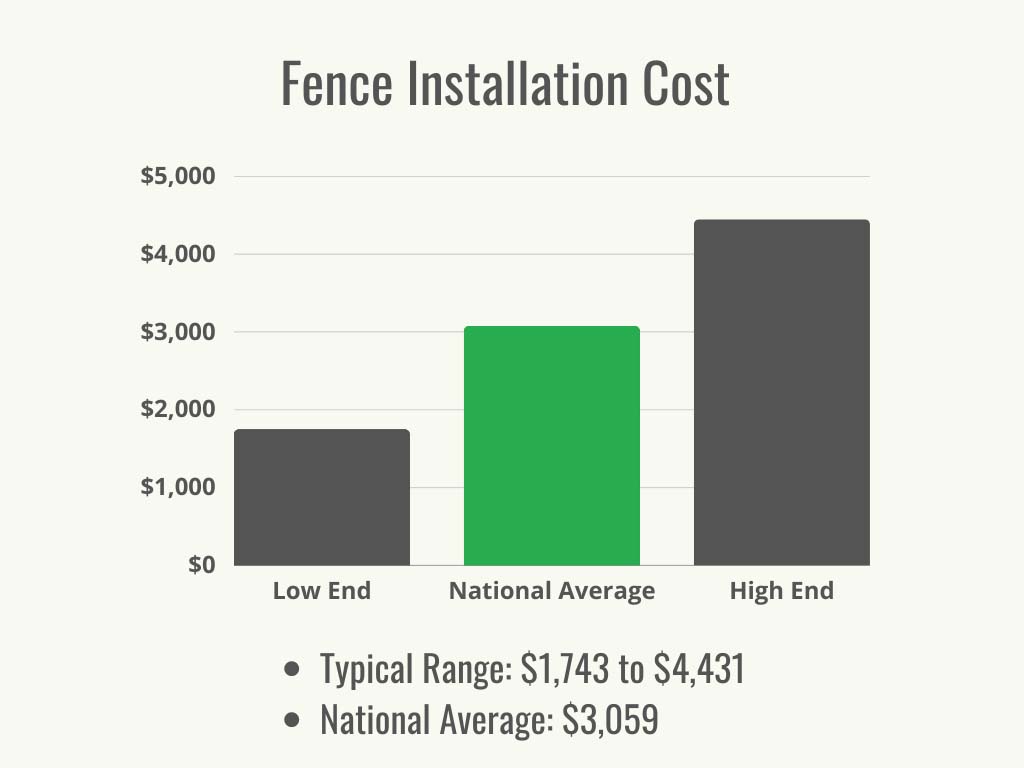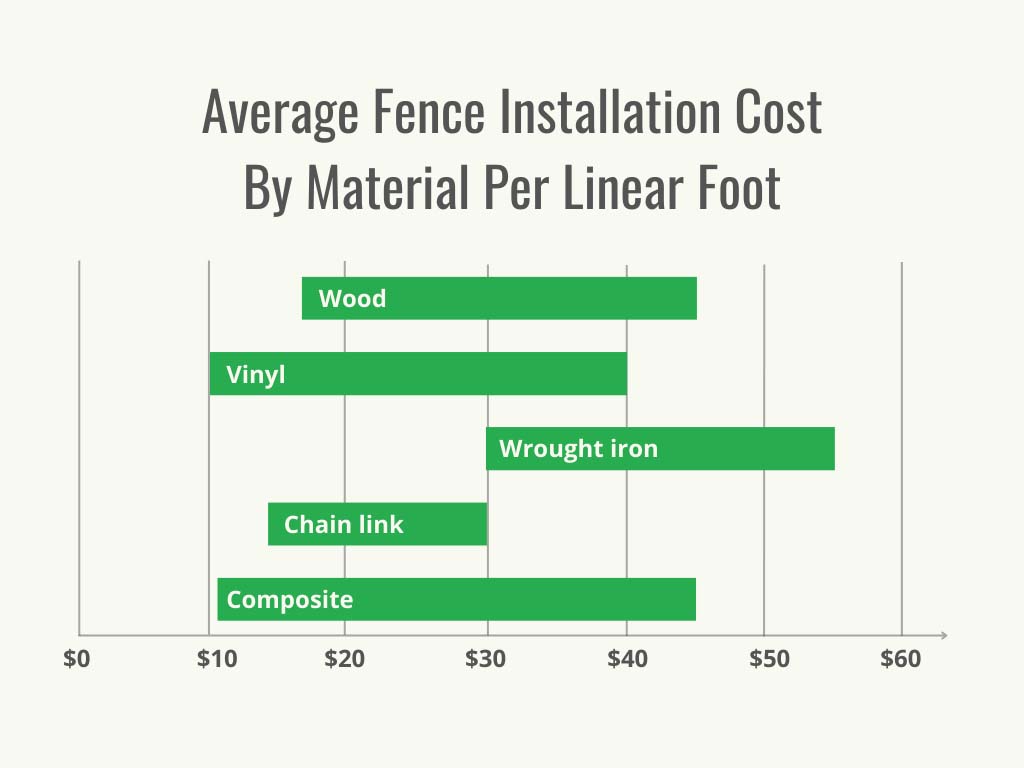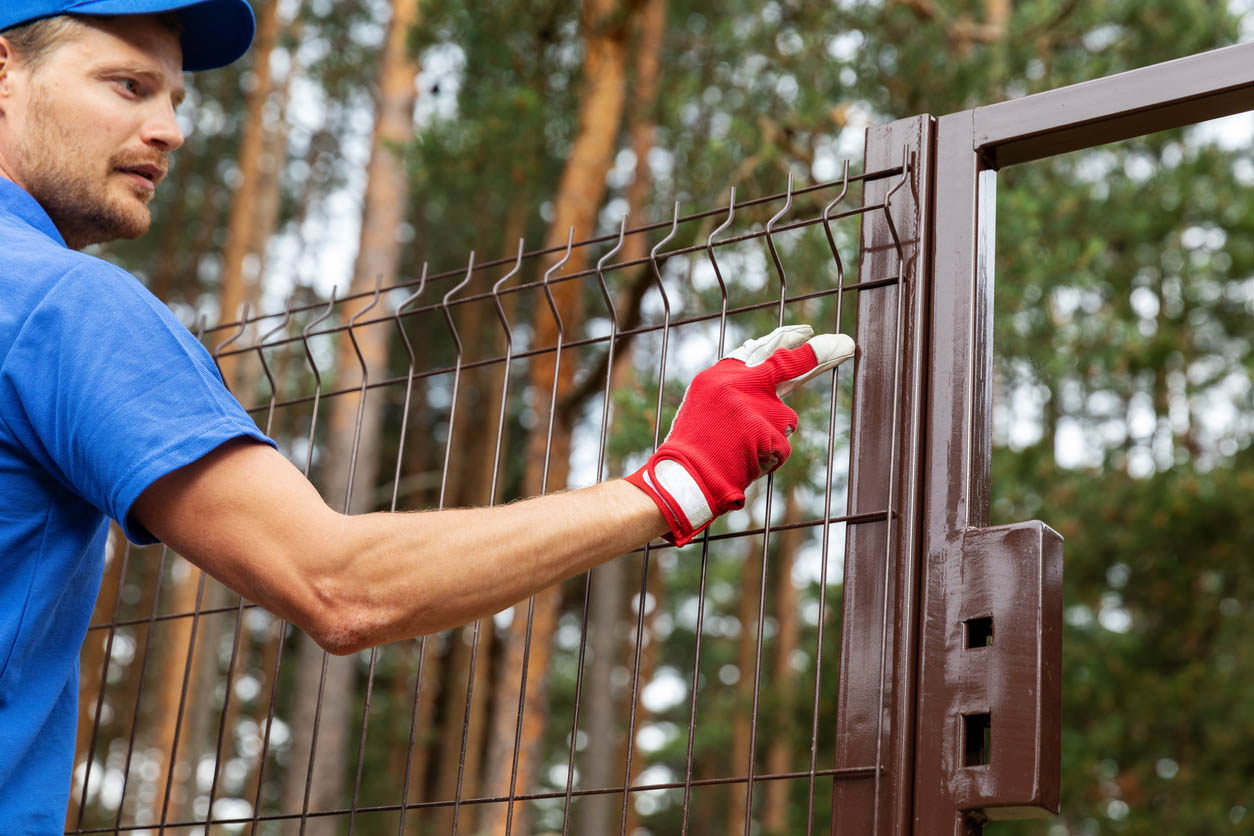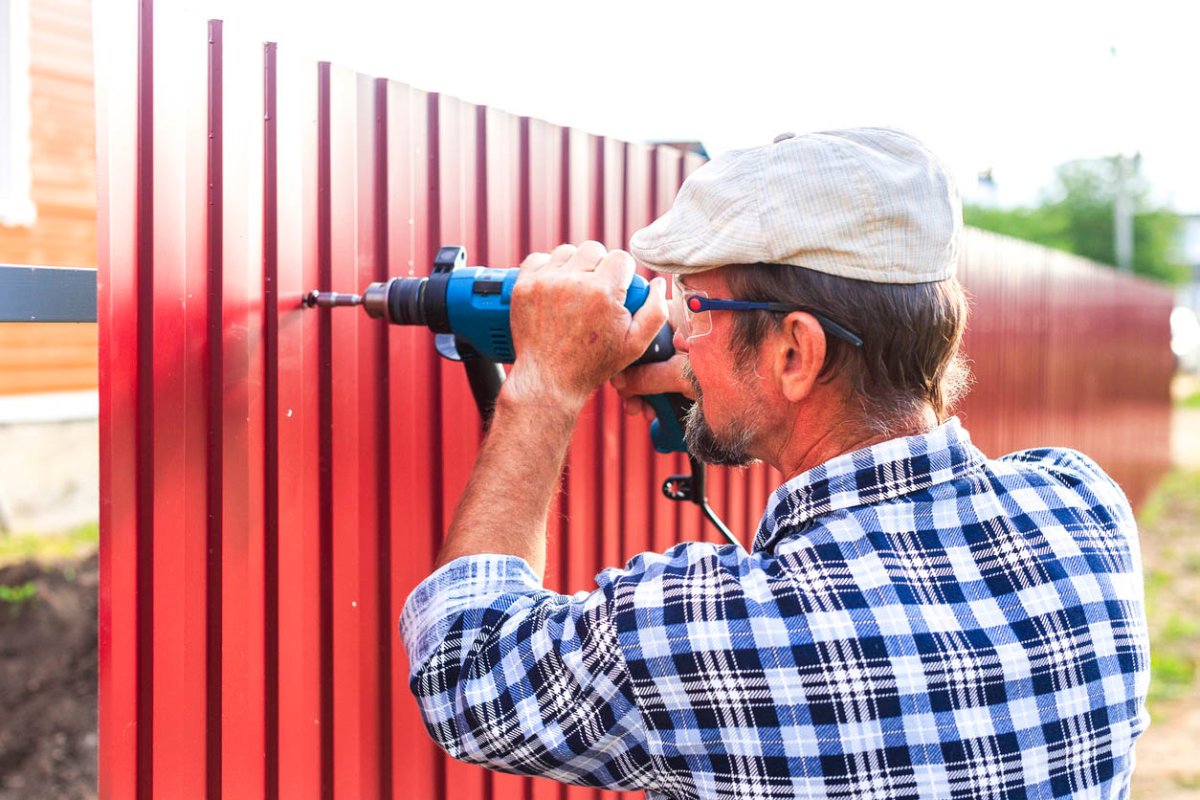We may earn revenue from the products available on this page and participate in affiliate programs. Learn More ›
Highlights
- The cost to install a fence typically ranges from $1,743 to $4,431, with homeowners across the country paying $3,059 on average.
- The biggest factors affecting the cost to install a fence include the size of the fence, materials, labor, and geographic location.
- Installing a fence can increase a home’s privacy, security, and property value, as well as reinforcing property lines and blocking unwelcome views.
- While some homeowners may be able to install a fence themselves, professional fencing companies can do so more efficiently and will be equipped to deal with any unexpected obstacles.
From vinyl to chain link to picket, fences are a proven way to boost curb appeal, corral pets and kids, and deter unwanted visitors. Fences can spruce up a property and increase a home’s value. Installing a fence might be more affordable than expected, depending on the fence material used. HomeAdvisor reports that, on average, homeowners spend between $1,743 and $4,431 for a new fence installation, with a national average of $3,059. Fence installation costs between $13 and $25 per linear foot on average. Wood fences cost less than metal fences, but many homeowners like a low-maintenance vinyl fence, too. Whether the project is a full privacy fence or a quintessential white picket fence, there are several factors for homeowners to review when planning a fence installation project.

Factors in Calculating Fence Installation Cost
Homeowners can expect materials and labor to each make up 50 percent of the overall cost to install a fence. The size of the area being fenced will also affect the price, so consider measuring the area first. If the site being fenced is not free of debris or there are a lot of rocks or roots in the soil, it may cost more to properly dig holes for the fence posts. In most areas, a building permit or permission from a homeowners association (HOA) or municipality will be required.
Fence Size and Height
It stands to reason that the larger the size of the fence, the more labor and materials will be needed to install it. This will naturally lead to a higher fence installation cost per foot. It is generally less expensive to fence in a suburban backyard than a large swath of land. For example, it typically takes between 100 and 300 linear feet of fencing to enclose a backyard, which can cost between $2,300 and $6,900. The following costs are applicable to homeowners with a larger property.
| Lot Size | Cost |
| ¼ acre | $10,200 |
| ½ acre | $13,800 |
| 1 acre | $19,500 |
| 2 acres | $30,000 |
| 5 acres | $43,000 |
| 10 acres | $61,300 |
| 20 acres | $87,000 |
| 25 acres | $98,000 |
| 40 acres | $122,500 |
Most residential fences are between 3 and 8 feet tall. Short 3-foot fences can be attractive decorative options (like a quaint wrought-iron or white picket fence) or serve as livestock enclosures on larger properties. They may also be used to close off a pool or a garden. It’s worth homeowners noting that a pool fence, which costs around $6,500, may need to meet a certain height requirement in order to be up to code. A shorter fence is likely to be less expensive, but it won’t provide as much privacy and security as a 6- or 8-foot one.
Fence Material and Style
There are numerous options for homeowners to choose from when it comes to different types of fence materials, and each has a different price point. These include wood, vinyl, wrought iron, chain link, and composite, as shown below.

While a wood fence remains a standard choice, vinyl is fast becoming a more popular option. Other choices include wrought iron, chain link, aluminum, or steel. Installing a chain-link fence is one of the cheapest options at $15 to $30 per linear foot, while a wrought-iron fence is more expensive at $30 to $55 or more per linear foot.
Homeowners will want to consider whether they want to add decorative features when budgeting for fence installation—the more complex the design, the higher the overall cost will be. Some of these options will be dictated by the material. For example, it would be possible to dress up a wooden fence with a lattice top or paint finishes, but these options don’t exist for a chain-link fence.
Labor and Geographic Location
Fencing a property is a time-intensive project, so it won’t be surprising for homeowners to learn that labor typically makes up half of the total price. Labor rates vary based on the fence material and how much work it takes to install the fence posts. The average fence installation price for labor is between $30 and $80 per hour, and most pros can complete 150 to 200 linear feet within 20 to 35 hours.
The average cost of fence installation is typically higher in more rural areas since materials and laborers must be transported from farther away. Some materials also cost more depending on the region. If a fence is located in an area that’s hard to reach, there may be added fees for location obstruction. Additionally, overgrown trees, narrow spaces, and parked vehicles can affect the ease of access. Costs may also vary based on the region of the country.

Additional Costs and Considerations
When budgeting for fence installation cost, there are only a few additional considerations for homeowners to take into account beyond the primary factors mentioned above since building fences is less complex than most construction projects. If a yard has a slope or thick vegetation along the property line, the price of a new fence will increase to accommodate the landscaping. Fence installation costs might also increase if a builder needs to remove old yard or garden fencing or install extra posts or gates.
Residential vs. Land vs. Commercial
A typical backyard fence is most often installed for the sake of privacy and security. This usually means that it will be 6- to 8-feet tall and made of a sturdy material such as wood or vinyl to shield the property from prying eyes. These materials come at a higher price point, but a backyard’s relatively small square footage can keep costs down. On a larger property, a fence may be erected to establish property lines or keep livestock or other animals contained. While these fences will necessarily be much longer, they are often made of inexpensive materials such as barbed wire. Commercial properties may require fencing for security purposes, and chain link is both an affordable and durable option.
Permits and Surveys
A qualified fence builder will know if local building codes require a permit to build a fence. There may be restrictions regarding the height of the fence or the materials used. On average, building permits cost between $400 and $800. Homeowners may want to double check with their local municipality about whether a permit is needed, and ask their contractor whether they will procure the permit or whether the homeowner will need to do so.
Landscaping
A significant factor that affects the fence price is whether the property has a slope or not. For a small slope, it may be best to have the ground graded evenly for a more level fence line. Significant changes in terrain will require special measuring and building techniques to align the fence properly. This process increases labor costs, but it’s worth the extra effort to have a sturdy fence. Fencing a yard with numerous obstructions or angles will also cost more since more posts will have to be installed.
Ground Condition and Tree Removal
In some cases, trees may need to be removed to install a fence; tree removal costs will depend on the size and accessibility of the tree, but average around $750 per tree. A significant root system will slow down digging fence-post holes, which increases labor costs. The same is true for rocky soil or existing concrete. If bedrock is found at the post depth, additional equipment will be required to bore through it.
Old Fence Removal
As is the nature of most outdoor structures, fences are affected by time and weather. Old fence panels will need to be removed before installing new ones. Eager homeowners may enjoy tearing out an old fence, but some stone or iron fences will require extra equipment to remove. It’s often best for a homeowner to leave the hassle to a pro who can make short work of fence removal and disposal for an average rate of $3 to $5 per linear foot.
Number of Gates and Posts
Posts will need to be set in concrete, usually below the frost line, which will help extend the life of the post. Homeowners can check to see if local building codes have a depth requirement for their region. The cost of posts and concrete averages between $5 and $150, depending on the post material. Posts are typically spaced 4, 6, or 8 feet apart. Adding a gate will increase the price depending on material, size, and style. A walk-through wooden gate averages $150 to $250, but a drive-through gate may cost $150 to $600 with another $100 to $250 for labor.
Utilities
Most suburban areas run their power infrastructure underground which can be an issue when digging. Accidentally hitting a power or gas line can have disastrous consequences. Homeowners and fence builders will want to check for underground gas, power, or electrical lines before digging to prevent problems. Local power companies typically check these for free, but working around them may increase the overall cost.
Fence Installation Cost by Material
Fence-building materials have expanded over the years. Barbed wire, wooden, and iron are still available, but vinyl, electric, invisible, and chain link are newer styles, each of which has its purpose. It’s usually possible to mix and match different types of fences to accommodate the property’s terrain and fencing needs. For instance, a garden fence could be built with cedarwood and mesh wire, the front yard could have a vinyl picket fence, and the backyard might have a wood privacy fence. The following are the most common types of fences and their average prices per linear foot.
| Type of Fence | Cost Range Per Linear Foot |
| Aluminum | $17 to $90 |
| Barbed-wire | $1 to $6 |
| Chain-link | $15 to $30 |
| Composite | $11 to $45 |
| Electric or invisible | $2.40 to $3.90 |
| Privacy | $35 |
| Split-rail | $15 to $25 |
| Steel | $17 to $90 |
| Vinyl | $10 to $40 |
| Wood | $17 to $45 |
| Wrought-iron | $30 to $55 |
Aluminum
For a low-maintenance option, aluminum might be a great choice if metal is the preferred style. A conversational or privacy fence can be built with aluminum. This type of fence provides durability and security and resists rusting. The cost of an aluminum fence averages $17 to $90 per linear foot, with labor adding another $30 to $80 per hour.
Barbed Wire
Barbed wire is an old standby choice of fencing for large properties that need to keep livestock contained. It’s simple to install and easy to maintain. Metal or wooden posts are driven into the ground, then spools of three to five strands of barbed wire are stretched between posts. Barbed wire is only allowed in rural areas. The average cost to install a barbed wire fence is $1 to $6 per linear foot.
Chain Link
A chain-link fence is a popular low-maintenance option that is easy to install and has a long lifespan. Additionally, chain-link fence cost is relatively low, making it fit most homeowners’ budgets with room to spare. A chain-link fence could be made of galvanized steel, powder-coated steel, aluminum, or sometimes vinyl. This style is not as attractive as most fences, but it still gets the job done to keep children and pets safely contained in a yard. Chain-link fence installation costs between $15 and $30 per linear square foot.
Composite
Composite fencing is typically made of at least two materials, often recycled, which results in a strong and affordable fence material. This type of fencing is often made from recycled wood, plastic, or even sawdust. On average, composite fencing costs about $11 to $45 per linear foot.
Electric or Invisible Fencing
Another fencing style used to keep livestock corralled is the electric fence. Wires or plastic strands with threaded wires are attached to wooden posts and connected to an electrical outlet that produces a low or high voltage shock designed to deter livestock from touching the fence. Again, for safety reasons, these are only used in rural areas and away from highways. An electric fence costs $2.40 to $3.90 per linear foot.
An invisible fence is installed in the ground at the property lines. The wires connect to a control panel that will trigger a small shock on a dog’s collar when it nears the buried wires. It’s an effective method to keep pets in the yard without having to build a complete fence. The average invisible fence cost is $200 to $2,500, depending on the size and number of pets. Homeowners will also need to factor the cost of training their dog to use the invisible fence into their overall budget.
Privacy
A privacy fence is a common choice for homeowners who share adjoining or backyard property and prefer to keep their peaceful evening on the deck a private affair. The best options are wood or vinyl, but metal could also be used—though at a higher price point. Privacy fences cost around $35 per linear foot. Installation of a 150-foot privacy fence costs between $1,500 and $8,000. Other privacy fence ideas include adding lattice to the top of the fence or growing green-space-friendly privet hedges as a cheap fence idea.
Split-Rail
More attractive than a barbed wire fence is the ranch fence specially designed to withstand the strength or height of the animals being corralled. A split-rail fence is a popular option that splits raw timber logs lengthwise and inserts them into wooden posts. A split-rail fence costs $15 to $25 per linear foot. Cedar posts and hewn rails are also popular. Wire mesh might be installed to prevent smaller animals from climbing through the rails. An average cost of $1,500 to $2,500 can be expected.
Steel
Steel is a popular low-cost alternative to wrought iron and is produced in a variety of styles. It is typically fairly lightweight and simple to install, although it is not as durable as classic wrought iron. A steel fence costs between $2,240 and $5,720 on average, or $17 to $90 per linear foot.
Vinyl
The biggest benefits of a vinyl fence vs. a wood fence are how easy it is to maintain and how long it lasts in climates without extreme temperatures. Vinyl fences don’t require painting or sanding, and the boards rarely rot or warp. White is the most common color, but others are available. Some composite vinyl fences include recycled materials like reclaimed sawdust that can be molded to create a faux wood appearance. Homeowners can expect vinyl fence installation cost to total between $2,240 and $5,480, or $10 to $40 per linear foot.
Wood
A wood fence is a traditional and affordable option that has a more natural look. The cheapest material is treated pine at $1.50 per linear foot. More exotic wood like redwood will cost closer to $17.50 per piece. Cedar is a popular option that’s durable and less expensive at $7 to $15 per linear foot. A wood fence can be painted or stained with one of the best fence stains, but any additional treatment will require regular upkeep. Wood fences do not have a long lifespan, which is an important factor to consider as wood fence installation costs $1,000 to $4,000 on average; or $17 to $45 per linear foot.
Wrought-Iron
For a stately, classic look, a wrought-iron fence is a top design option. This type of fence is durable, stylish, and customizable. It’s best to have a pro handle the design and installation of this fence style since it’s more specialized. A wrought-iron fence needs a regular application of rust-inhibiting spray. On average, the wrought-iron fence cost per-linear foot is $30 to more than $55.

Benefits of Installing a New Fence
It isn’t always clear to homeowners whether they need to build a fence, or if this is a frivolous expense. Perhaps the garden could use fencing to keep wild rabbits out, or there isn’t sufficient privacy from the neighbors, or maybe a fence would deter any unwanted two- or four-legged visitors. Whatever the reason, installing a fence can increase a home’s value and even hide unsightly junk piles from view.
Increased Home Value
A home with a backyard fence is considered more secure, even if it’s just a chain-link fence. An attractive fence boosts a home’s curb appeal. Adding plants or vines is another way to enhance the appearance of a fence and the home’s attractiveness. A home that has a well-maintained fence on the property may sell more quickly, too.
Improved Security
A house with a sturdy fence surrounding the backyard is typically more successful at deterring strangers from entering the yard. Lawn equipment and toys can still be stored in the backyard without a high risk of being stolen. A fence is also helpful for keeping deer and other wild animals off the property—if it’s built high enough.
Enhanced Privacy
Even the friendliest of neighbors can become tiresome. One of the best and easiest ways to create a quiet environment for the family is to install a fence along the property. A standard 6-foot fence is usually sufficient to allow the homeowner to enjoy a private soak in their hot tub without a neighbor walking up for an evening chat. For additional sound and view blockage, homeowners may want to consider adding trees near the fence line.
Established Property Boundaries
Even a small yard can experience property line challenges. Strangers might walk across the lawn to cut the corner, or a neighbor might want to build a structure that infringes on the property. Building a fence on a property’s boundary can prevent any encroachment or trespassing that happens—intentionally or not.
Blocked Eyesores
Not every backyard view is paradise. Whether the patio overlooks a dilapidated structure or messy neighboring yard, a privacy fence can hide eyesores while making it possible to enjoy an evening outdoors. In this case, a chain-link fence won’t quite do the job, so homeowners will want to choose a full paneled fence made of wood, aluminum, or vinyl.
DIY vs. Hiring a Professional
Since fence installation costs are split evenly between materials and labor, installing a fence as a DIY project is a tempting prospect. On the surface, it seems pretty straightforward: Dig a hole, put in a post, and hang a fence panel. In reality, building a fence can be complex if the ground is unevenly graded or challenging to dig into, and hanging fence panels evenly takes care and skill to ensure the fence is straight and sound. While a chain-link fence may be the easiest of all the fences to consider DIY-ing, wrought-iron fences and other metal fences are best left to one of the best fence companies who are familiar with the material and have the equipment to handle it.
While homeowners may save money installing some types of fences on their own, they’ll lose money in the extra time it takes to build it. A professional team of installers can build up to 200 linear feet in less than 4 days, but it may take double the time for a homeowner without experience. Professionals also have the equipment needed to build a fence and are comfortable using it all, whether it’s a circular saw, concrete mixer, drill, or post hole digger.
As is usually the case, there’s added peace of mind when a homeowner uses qualified installers since they are licensed and insured against any accidents, and they may have a warranty that covers damage to the fence. That’s a helpful advantage for homeowners, especially if the area experiences significant weather events or the yard is frequently used by rambunctious teens. A professional installer will know how to handle the obstacles on the property, including bedrock, trees, structures, and more. The fence will be level, sturdy, and straight for years to come.
How to Save Money on Fence Installation
Depending on the type of fence and the total area being enclosed, fence installation costs can quickly add up. Consider these tips for how to save money when building a fence:
- Get multiple quotes. Always ask for several quotes from fence contractors to ensure you’re getting a reasonable price, quality workmanship, and a warranty.
- Be selective. Choose a fence style that suits your house, needs, and budget rather than the most expensive style.
- Consider sourcing your own materials. In some cases, you might be successful finding a good deal on the preferred fence material by shopping independently.
- Choose an experienced contractor. Ideally, a professional fence installer will have more than one person working on the job, and they’ll be proficient enough to complete the job promptly.
- Consider long-term maintenance. Wood fences require more frequent upkeep than most other fence types. Though they have a cheaper up-front cost, they may cost more in the long run, so consider which is better for your budget.
- Prepare the yard ahead of time. Remove any objects or landscaping from the work area to prevent the installers from slowing down or possibly damaging an item during installation. They can complete the job faster if they can work efficiently.
- Collaborate with a neighbor. If your property shares a fence line with a neighbor, consider asking them to split the fence installation cost.
Questions to Ask a Pro
When considering building a new fence, it’s natural for questions to arise. Talking with fence installers can help clear up any concerns, and they might even offer suggestions. The following are some helpful questions for homeowners to ask about fence installation:
- How long have you been in business?
- Are you licensed and insured?
- What kind of warranties do you offer?
- Do you have references I can contact?
- Do I need a permit to install a privacy fence? If so, does your company obtain it?
- Will you contact utility companies to check for buried power or gas lines?
- Can you provide a line-item quote or contract?
- Do you require a deposit?
- What kind of fence material is best for my climate?
- Will you inspect my property first to provide an accurate quote?
- My yard has a slope in the back. How much more will that cost me?
- How much will a drive-through gate cost to install?
- How will you determine how many posts are needed for my property?
- Do you send a team of builders or only one person?
- How long would the project take?
- Can you handle building more than one style of fence in the front and backyard?
- How long will my fence last?
- What kind of maintenance will my fence need?
- What happens if my fence is damaged in a storm?
FAQs
Fence building isn’t as complex a process as building a house, but some questions may need addressing. With the information above, homeowners will likely know what to expect regarding fence installation costs, but they may still want to review the following answers to some frequently asked questions, just in case.
Labor is usually half the total fence installation cost. The average range for installing a fence is $1,667 to $4,075, depending on the materials and size of the property. Chain-link and wood fences are the cheapest, and metal fences are the most expensive.
The lifespan of a fence is dependent upon the material. There is variation between different woods: a cedar fence may last 15 to 30 years, an untreated pine fence might last only 5 to 12 years, and treated pine may last 20 years. Regular maintenance will increase the life of a wood fence. A vinyl fence resists weathering if it’s built in climates without extreme heat or cold and can last 20 years or more. Galvanized chain-link fences may last 20 years or more, depending on the coating and weave. Metal fences typically need a rust-inhibitor coating applied every few years to lengthen the lifespan.
The answer to this question depends on the homeowner’s needs and location. In a rural area, barbed wire or electric fences can keep livestock enclosed. In urban areas, an invisible electric fence may be best to keep pets in the yard. For aesthetic purposes, a 3-foot conversation fence might be suitable in the front yard, but an entire privacy fence may be preferred for the backyard. Fences can be made of split rails, wood panels, decorative wood, mesh, chain link, vinyl, composite vinyl (faux wood), aluminum, steel, or wrought iron. More than one fence type can be built on a property, and a fence builder can easily coordinate the colors and styles that will suit a homeowner’s needs and preferences.
Yes. A well-kept fence boosts the value of a home by offering security, privacy, and curb appeal. Potential home buyers will appreciate that the property is already secure and finished.
A wood fence requires frequent maintenance since it’s most susceptible to moisture. Staining a fence will help lengthen the longevity of the fence. A wrought-iron or steel fence will need to be treated with a rust inhibitor to prevent rusting. Vinyl fences are low maintenance and can be sprayed off with water when they appear dirty.
Angi, HomeAdvisor, HomeGuide

